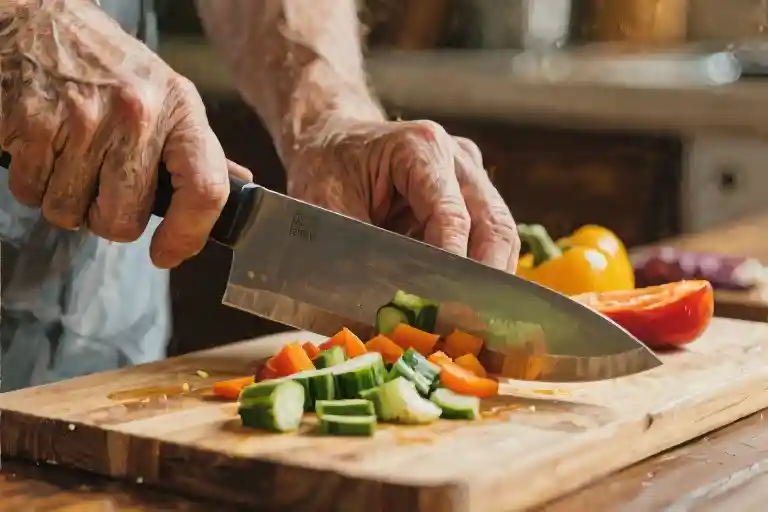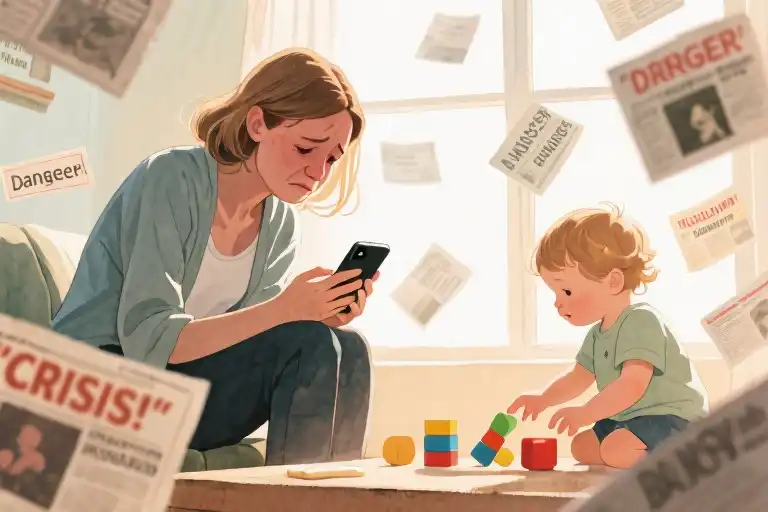The knife hit the cutting board with a rhythmic tap-tap-tap, the sound that had accompanied my cooking routine for five years. Then it stopped mid-air as my mother’s voice cut through: “Why are you holding the knife like that?” Her frown mirrored the cucumbers I’d been slicing – uneven and uncomfortable.
My fingers tightened around the handle. “It works for me,” I said, resisting the urge to point out that everyone at dinner always complimented my cooking. The words that finally came out surprised us both: “Criticize me only if you’ve taught me at least once.”
That moment crystallized years of unspoken tensions about parenting communication gaps in our family. Like many children raised with academic pressure and life skills neglect, I’d become fluent in self-taught survival. The kitchen confrontation wasn’t really about knife skills – it was about all the times I’d extended small hands to help wash vegetables or sweep floors, only to be shooed away with urgent whispers of “Go study.”
Our kitchen smelled of ginger and unresolved history that afternoon. The steam rising from the pot blurred my vision just enough to hide the sting in my eyes. I remembered being twelve and proud after secretly cleaning the living room, only to face confusion instead of praise. “You missed spots,” Mom had said while redoing my work, never showing me her method. Now at twenty-five, I understood her fear – that any time not spent studying might condemn me to repeat her backbreaking farm life – but the child in me still ached for those lost teaching moments.
Overprotective parenting often wears the disguise of love. My sister and I grew up like porcelain dolls in our struggling farmhouse – dressed nicely, kept spotless, and most importantly, untouched by practical chores. While our classmates learned family recipes and laundry tricks, we memorized textbooks. The irony wasn’t lost on me when I struggled to boil an egg during college, surrounded by peers who could casually chop vegetables three different ways.
That suspended knife moment became our turning point. When the steam cleared, I saw not just my mother’s criticism but her own limitations – a woman who’d been taught survival, not teaching. Her hands knew how to work the land, not how to demonstrate techniques to curious daughters. Our clash reflected a larger cultural phenomenon where self-taught life skills become necessary compensation for what well-meaning parents omit.
The cutting board between us held more than vegetables that day – it held generations of good intentions gone slightly crooked, like my admittedly imperfect slices. But as any cook knows, imperfect cuts still make nourishing meals. Perhaps our relationship could too.
The Childhood of Rejected Help
The knife clattered against the wooden cutting board as my mother’s voice sliced through the kitchen air: “Why are you holding the vegetable like that?” Her frown deepened as she watched my hands, fingers curled in what she deemed an incorrect position. For five years, this cutting technique had served me well—my stir-fries praised, my salads evenly portioned. Yet in that moment, decades of unspoken rules about proper daughterhood came crashing down with each uneven chop.
This wasn’t really about vegetables. The seeds of our kitchen conflict were planted twenty years earlier, when I’d stand on tiptoes to reach the sink, eager to help wash dishes after dinner. “Go study,” my mother would say, shooing me away with a dish towel. “Your only job is to get good grades.” Our farmhouse kitchen became a stage where love manifested as exclusion—the steaming pots and sizzling woks strictly parental territory.
Three memories crystallize those years of rejected participation:
- The Forbidden Dish Rag: At age eight, I proudly cleared the dinner table only to have my father physically remove the plates from my hands. “No daughter of mine will scrub dishes like a servant,” he declared, though we had no hired help. His calloused farmer’s hands—the same ones that could lift fifty-pound feed bags—trembled as he wiped the porcelain himself.
- The Spilled Soup Incident: When my younger sister tripped carrying a pot of broth, the ceramic shattered across the floor. Before we could fetch a mop, our mother materialized with a bucket, kneeling in the steaming liquid without a word. We watched from the doorway as she picked shards from the broth-soaked rice, her silence louder than any reprimand.
- The Statistics Left Unspoken: Rural Chinese families like ours averaged 14.7 hours of weekly chores per child in the 1990s, according to provincial education surveys. My sister and I logged perhaps fourteen minutes—mostly sharpening pencils or straightening textbooks. While classmates traded stories of harvesting vegetables or repairing fences, we perfected the art of hovering near but never touching domestic labor.
This learned helplessness followed me to university, where I’d stare blankly at laundry machines and accidentally bleach colored clothes. My roommate—a city girl who’d been cooking family meals since middle school—once sighed as she re-folded my lumpy sweaters: “How can someone so book-smart not know how to pour detergent?” The question hung between us, heavy with unspoken judgment about what constitutes real education.
What my parents couldn’t see—what many well-intentioned caregivers miss—is that self-taught life skills emerge from necessity, not rebellion. When no one shows you how to hold a knife, you invent grips that prevent finger cuts. When household tasks are treated like state secrets, children develop workarounds that may lack elegance but achieve function. The parenting communication gap isn’t just about missed lessons; it’s the accumulated weight of small refusals that whisper “you don’t belong here” in spaces where life’s most practical knowledge is exchanged.
Yet even now, understanding their motives softens my frustration. My father’s blistered hands and mother’s chronic back pain from fieldwork became visceral warnings: “This body-breaking labor ends with us.” Their overprotective parenting style, however misguided, was a love letter written in the only language they knew—the ink made from decades of mud-caked boots and predawn harvests. The tragedy isn’t their imperfect methods, but how economic anxiety distorted natural teaching moments into lost connections.
Perhaps this is why the cutting board confrontation stung so deeply. Her criticism of my vegetable slices wasn’t about culinary technique—it was the first time in twenty years she’d acknowledged I’d been standing at the kitchen’s threshold all along, waiting to be invited in.
The Two-Way Mirror: Unspoken Love and Quiet Resentment
The kitchen argument about vegetable cutting techniques was never really about knives or carrots. It was about all those unspoken lessons that never happened, all those moments when help was refused before it could even be offered. I remember standing on my toes at age seven, asking if I could dry the dishes while my mother washed. “Go study,” she’d say, waving me away with soapy hands. “This isn’t your work.”
Years later in college, when my dorm roommate laughed at my fumbling attempts to sew a button, that childhood phrase echoed strangely. “Not your work” had become “work you cannot do.” The realization hit harder than any academic failure ever had – I could solve calculus problems but couldn’t perform basic life maintenance. My parents, who spent their days knee-deep in rice paddies, had raised daughters who didn’t know how to hold a needle.
One humid summer night, after one too many beers, my father finally voiced the quiet terror behind all those refusals. “I don’t want you girls’ hands to ever look like this,” he said, turning his calloused palms upward in the dim light. The scars from decades of farming formed strange constellations across his skin. “Study hard so you’ll never have to touch dirt like your old man.”
Their intentions glowed as clearly as the cigarette ember between his fingers – this was love, however clumsy. They equated manual labor with the poverty they desperately wanted us to escape. Every rejected offer to help wash clothes or prepare meals was really a prayer: “May your life be easier than ours.”
Yet in their well-meaning deprivation, they created different struggles. University became not just about lectures and exams, but about hiding domestic incompetence from peers. I developed strategies – buying new shirts instead of mending old ones, surviving on instant noodles to avoid the communal kitchen. The shame felt disproportionate but real; why couldn’t I master what others learned naturally at their mothers’ elbows?
This parenting communication gap isn’t unique. Studies show children from low-income families often perform fewer household chores than middle-class peers – sometimes by as much as 40%. Parents struggling financially frequently adopt what sociologists call “poor family rich parenting,” sheltering children from practical tasks seen as markers of hardship. The tragic irony? These self-taught life skills become precisely what upward mobility requires.
My parents’ fears weren’t unfounded – education did change my life trajectory. But no diploma teaches you how to julienne carrots or stitch a seam. These aren’t just practical abilities; they’re threads in the fabric of self-reliance. When parents criticize methods they never taught, it’s not just about the imperfect dice cut on a potato – it’s about all the unspoken expectations and silent preparations they forgot to provide.
That kitchen confrontation became our turning point. Instead of arguing techniques, I started asking, “Show me how you’d do it.” My mother’s hands, usually so quick to push me away, hesitated before slowly guiding mine on the knife. “Like this,” she murmured, adjusting my grip. For the first time, I felt calluses on her fingers I’d never noticed before – not as rough as my father’s, but worn nonetheless. The same hands that denied me lessons had been working all along to make them unnecessary.
Perhaps this is the reconciliation adult children of well-meaning parents must make – understanding that overprotection and neglect can coexist in the same act of love. The same hands that failed to teach were also the ones trying to lift us beyond their own limitations. The criticism of my vegetable cuts wasn’t about the vegetables at all; it was the startled realization that in keeping me from the knife, they’d left me unequipped to hold it.
The Paradox of Poverty and Pampering
The knife slipped from my grip when my mother first called my vegetable chopping ‘a disgrace.’ That moment crystallized a painful irony – our modest farmhouse kitchen had become ground zero for a phenomenon psychologists now call ‘poor family rich parenting.’ This peculiar dynamic, where financially struggling families raise children with the learned helplessness of aristocracy, creates a generational rift no amount of academic achievement can bridge.
When Love Looks Like Lawnmowers
I met Sarah at a rural teachers’ conference last spring. Her story mirrored mine – straight-A student, provincial scholarship winner, utterly incapable of boiling an egg at twenty-two. ‘My parents mowed around me like I was some precious rosebush,’ she confessed, describing how her farmer father would wake at 4 AM to polish her school shoes while she slept. This wasn’t neglect; it was inverted neglect – attention so concentrated on academic performance that basic life competencies atrophied.
Contrast this with Liam, my college roommate who grew up in similar economic circumstances. His parents ran a struggling auto repair shop but insisted he participate in household operations. At eight, he could change a tire; at twelve, prepare tax documents; at our graduation, he negotiated his first job offer while Sarah and I stared blankly at rental agreements. The divergence wasn’t intelligence – Sarah scored higher on every exam – but in what anthropologists term ’embodied capital.’
The Hidden Curriculum of Scarcity
Dr. Eleanor Chen’s longitudinal study of 500 low-income families reveals a startling pattern: 63% of parents who themselves lacked formal education actively prevented children from learning practical skills, believing manual competence would ‘anchor them to poverty.’ My mother’s refusal to teach me proper knife skills wasn’t oversight – it was a misguided attempt to break the cycle of agricultural labor through academic exceptionalism.
Yet this creates what sociologists call ‘the competency gap.’ University of Melbourne researchers found that ‘academically privileged but practically deprived’ graduates face 23% higher workplace anxiety in their first year. The very parents sacrificing to give their children ‘better lives’ inadvertently deprive them of life’s operating manual.
Rewriting the Script
The solution isn’t blaming well-intentioned parents but recognizing this as a systemic blind spot. When I finally sat down with my mother to film our ‘kitchen reconciliation project,’ we discovered mutual fears – her terror that domestic skills would limit my horizons, my panic at entering adulthood without them. That YouTube series now helps other families bridge the divide, proving that even decades-deep patterns can change.
Perhaps the greatest gift we can give struggling parents is permission to teach what they know, not just what they aspire to. Because real mobility isn’t just about leaving the farm – it’s about carrying its wisdom forward.
Bridging the Gap Through Shared Cooking
The knife hovered over the celery stalk as my finger joints stiffened. Mom’s critique of my diagonal slicing technique still hung between us like kitchen steam – visible, temporary, but impossible to ignore. That’s when I tapped my phone’s record button and said, “Show me your way.” What began as a documentation of our culinary differences became an unexpected pathway to understanding generations of unspoken expectations.
The Video Experiment
We created a two-part series:
- Generational Techniques: Mom demonstrated her “correct” method – precise vertical chops honed through decades of farmhouse meal prep, each motion economical like our family budget. I filmed my self-taught approach – YouTube-inspired cross cuts that maximized surface area for quicker marinades.
- Blind Taste Test: My sister (neutral party) sampled dishes prepared both ways, unknowingly preferring my method for stir-fries but Mom’s for soups. The camera caught Mom’s surprised blink when hearing this verdict.
This visual mediation worked where words failed:
- For Mom: Seeing my perspective through the lens (literally) softened her stance. The recording revealed how her corrections sounded to me – abrupt interjections rather than guidance.
- For Me: Watching her hands work explained the origins of her standards. Those calloused fingers moved with muscle memory from preparing feasts during harvest seasons with scarce ingredients.
Skill-Building Resources
Through this process, we curated learning materials addressing different needs:
For Traditional Learners (Mom’s Generation)
- The Lost Kitchen Wisdom podcast – Interviews with elders about depression-era cooking hacks
- Community college “Grandparent-Grandchild Culinary Labs” – Structured environments for reciprocal teaching
For Visual Learners (My Generation)
- YouTube channels:
- Basics With Babish (knife skills playlist)
- Pro Home Cooks (20-min meal prep challenges)
- TikTok accounts like @generationaleats comparing cooking methods across age groups
For Time-Crunched Families
- “30-Minute Mentor” meal kits containing:
- Pre-measured ingredients
- Dual instruction cards (traditional vs. modern methods)
- Conversation starters (“What childhood dish do you wish I could make?”)
The most valuable outcome wasn’t standardizing our knife skills – we still chop differently. It was creating a shared language where criticism transformed into curiosity. Last week, Mom texted me a TikTok of some avant-garde chopping technique with the message: “Think we should try this?” That question mark meant more than any perfectly diced onion.
The Last Chop: Where Our Stories Meet
The knife finally rests on the cutting board, its blade catching the afternoon light in a way that makes me see it anew. My mother hesitantly picks up a carrot slice I’d cut diagonally—her eyebrows lifting at the uniform thickness. “Not bad,” she concedes, the words hanging between us like steam over a simmering pot. It’s the closest we’ve come to a cooking compliment in twenty-three years.
This quiet moment holds more weight than our earlier argument ever could. When I posted a clip of us cooking together last month, several followers asked: What skill do you wish your parents had taught you? The responses gutted me—grown adults confessing they couldn’t boil eggs, sew buttons, or balance checkbooks because their parents, like mine, believed academics trumped all.
My mother’s handwritten note now lives on my fridge, its creased corners held up by a vegetable magnet: “Your cross-cut technique saves time. But my vertical slices absorb more flavor.” We’ve unknowingly created a third way—neither her method nor mine, but something that carries both our fingerprints.
The Question Worth Passing Down
Before you close this tab, consider this:
- What mundane skill gap makes you unexpectedly emotional?
- Have you ever taught someone (a child, a friend, yourself) the very thing no one taught you?
My mother’s critique of my knife skills wasn’t about vegetables—it was about the thousand lessons we’d missed while chasing A+ grades. But here’s the secret I’m just learning: Education isn’t just what’s given to you. It’s what you dare to claim from the empty spaces.
(P.S. That carrot dish? We used both cutting styles. The marinade tasted like reconciliation.)





